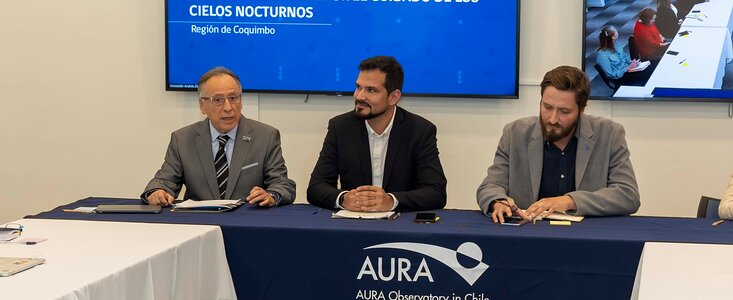ann23015 — Announcement
Launch of New Regional Committee for Night Sky Protection in Coquimbo, Chile
New effort will help protect Chile’s exceptional night skies from light pollution
28 April 2023
Both AURA in Chile and NSF’s NOIRLab in Chile have been advocates for the formation of the Regional Commission for the Protection of the Night Skies of the Coquimbo Region in Chile, and on Monday 17 April 2023 in the offices of AURA in La Serena, Chile, local regional authorities signed a decree that established it. This new commission, which will help preserve and protect Chile’s exceptional night skies from light pollution, will be chaired by the Regional Presidential Delegate, Rubén Quezada. The Regional Ministerial Secretariat of Science, Technology and Innovation will serve as head of the technical secretariat.
AURA and NOIRLab will actively participate in this public-private commission, which will be integrated into various regional ministerial secretariats, municipalities, international observatories, and universities. The commission will develop strategies and outline actions to preserve the night sky and address the challenges of light pollution.
The first meeting of this commission was held after the signing of the decree and was chaired by Rubén Quezada, who said, "As has been mandated by Chilean President Gabriel Boric, we must work together — the government, academia, and the private sector. That is why we formed this commission to develop and put this issue [dark-sky preservation] on the table and take concrete measures to guarantee its conservation.”
One of the challenges addressed in this session was to outline the actions needed to protect the sky from light pollution and to identify the additional scientific efforts and capacities necessary for public services and municipalities.
Deputy Director of AURA in Chile Hernán Bustos, who hosted the meeting, pointed out: “We are happy to be part of this commission and to add our experience to help protect the outstanding Chilean night sky. We also look forward to contributing to the sustainability of the international observatories in the country, to improve the quality of life of the people, and to take care of the fauna of the region.”
The Regional Coordinator of the Ministry of Science of the regions of Valparaíso and Coquimbo, Sebastián Díaz, also said, “Part of the initial guidelines now is to begin to identify potential initiatives and projects that allow us to connect this commission with the local municipalities, promote projects that will allow us to address the growth of light pollution in the Coquimbo Region, and strengthen the role and the link that the state has with the universities of the region.”
Northern Chile, which includes the Coquimbo Region, has exceptional skies for astronomy. It is also the region where AURA in Chile, through NOIRLab, operates Cerro Tololo Inter-American Observatory, Gemini South (part of the International Gemini Observatory) and SOAR Telescope and will operate Vera C. Rubin Observatory, when it starts operations in 2025.
More information
NSF’s NOIRLab (National Optical-Infrared Astronomy Research Laboratory), the US center for ground-based optical-infrared astronomy, operates the International Gemini Observatory (a facility of NSF, NRC–Canada, ANID–Chile, MCTIC–Brazil, MINCyT–Argentina, and KASI–Republic of Korea), Kitt Peak National Observatory (KPNO), Cerro Tololo Inter-American Observatory (CTIO), the Community Science and Data Center (CSDC), and Vera C. Rubin Observatory (operated in cooperation with the Department of Energy’s SLAC National Accelerator Laboratory). It is managed by the Association of Universities for Research in Astronomy (AURA) under a cooperative agreement with NSF and is headquartered in Tucson, Arizona. The astronomical community is honored to have the opportunity to conduct astronomical research on Iolkam Du’ag (Kitt Peak) in Arizona, on Maunakea in Hawai‘i, and on Cerro Tololo and Cerro Pachón in Chile. We recognize and acknowledge the very significant cultural role and reverence that these sites have to the Tohono O’odham Nation, to the Native Hawaiian community, and to the local communities in Chile, respectively.
Contacts
Charles Blue
Public Information Officer
NSF NOIRLab
T: +1 202 236 6324
Email: charles.blue@noirlab.edu

